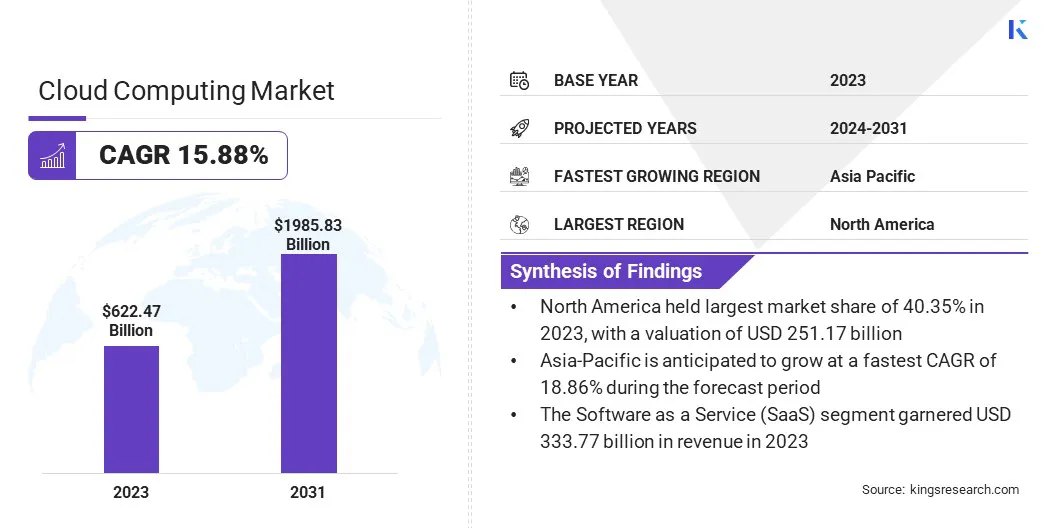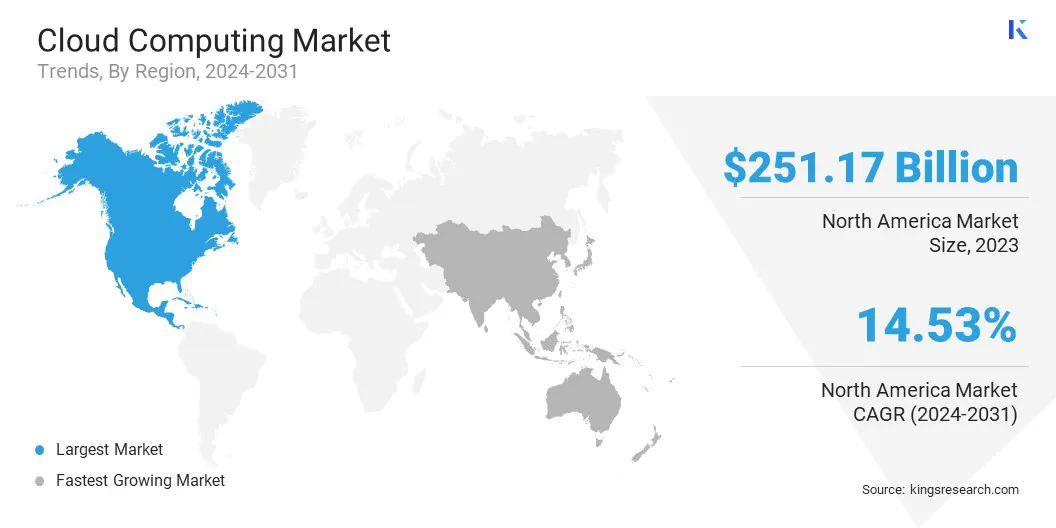Enquire Now
Cloud Computing Market Size, Share, Growth & Industry Analysis, By Service Model [Software as a Service (SaaS), Infrastructure as a Service (IaaS), Others], By Workload, By Deployment, By Enterprise Size, By End Use and Regional Analysis, 2024-2031
Pages: 180 | Base Year: 2023 | Release: January 2025 | Author: Siddhi J.
The global cloud computing market size was valued at USD 622.47 billion in 2023 and is projected to grow from USD 707.94 billion in 2024 to USD 1,985.83 billion by 2031, exhibiting a CAGR of 15.88% during the forecast period.
Cloud computing boosts business flexibility by allowing rapid deployment of applications and services. This enables organizations to swiftly adapt to market shifts, drive innovation, and meet customer demands, thereby improving efficiency and gaining a competitive edge.
In the scope of work, the report includes solutions offered by companies such as Amazon Web Services, Inc, IBM Corporation, Alibaba Cloud, SAP SE, Salesforce, Inc, Oracle, Adobe, Workday, Inc., Fujitsu, Broadcom Inc., and others.
The cloud computing industry has undergone rapid evolution, emerging as a crucial component for businesses across industries. As organizations adopt cloud-based solutions, significant investments are being made in infrastructure, software, and services.
The demand for flexible, scalable, and cost-effective IT solutions is fueling this expansion, with cloud platforms offering robust tools for collaboration, data management, and computing power. The market is marked by innovation, competition, and a growing shift toward more integrated, advanced cloud ecosystems.
The cloud computing market encompasses services delivered over the internet, including storage, processing power, databases, networking, and software applications. These services allow businesses and individuals to access computing resources without owning or maintaining physical infrastructure. The market includes solutions ranging from basic data storage to complex enterprise systems that are scalable, cost-effective, and accessible globally.
As organizations shift from traditional on-premise IT models, cloud computing provides increased flexibility, faster service deployments, and simplified data management. It is a key element of digital transformation, fostering innovations across sectors and continuing to grow organizations seek efficient, agile, and secure solutions.

The cloud computing market is dominated by companies that focus on strategic partnerships, infrastructure scaling, and innovation to maintain a competitiveness. Leading providers are enhancing their offerings by integrating cutting-edge technologies such as artificial intelligence and machine learning into their platforms, enabling faster data processing and delivering valuable insights to businesses.
Additionally, leading players are investing heavily in building robust security protocols to maintain client trust. Their focus on providing scalable and cost-efficient solutions is central to meeting diverse customer needs across industries.
Increased internet penetration, coupled with the expansion of mobile networks, is significantly boosting the growth of the cloud computing market. As access to fast and reliable internet rises, the demand for cloud-based services grows. This connectivity enables businesses to remotely store, manage, and process, enhancing efficiency and scalability.
Additionally, mobile networks facilitate access to cloud services from anywhere, promoting adoption and creating new opportunities for businesses to leverage cloud solutions.
Compliance and regulatory issues are presenting significant challenges to the growth of the cloud computing industry, particularly for businesses operating across multiple regions. The complexity arises from varying regulations in different jurisdictions, making it difficult to ensure consistent compliance.
This challenge can be addressed by leveraging cloud service providers that offer built-in compliance tools and certifications, automating compliance processes and conducting regular audits. Additionally, partnering with legal and regulatory experts may help businesses stay informed on evolving laws and ensure efficient compliance.
The cloud computing market is witnessing significant growth, mainly driven by innovations such as multi-cloud, hybrid cloud, edge computing, and serverless computing. These advancements allow businesses to leverage the flexibility and scalability of multiple cloud providers, enhance performance by processing data closer to the source, and optimize resource management by eliminating server management overhead.
This is enabling organizations to improve efficiency, reduce costs, and foster innovation, offering more tailored cloud solutions for diverse industries ands government organizations.
Another growing trend in the cloud computing market is the increasing adoption of artificial intelligence (AI) and machine learning (ML) technologies. Cloud platforms offer the scalability and computing power needed to deploy AI and ML applications efficiently, enabling businesses to foster innovation and enhance operational capabilities.
With the ability to process large datasets and leverage advanced algorithms, organizations can optimize decision-making, improve customer experiences, and automate processes. The integration of AI and ML with cloud computing driving industry transformation, fueling business growth and technological advancements.
The global market has been segmented based on service model, workload, deployment, enterprise size, end use, and geography.
Based on service model, the market has been segmented into software as a service (SaaS), infrastructure as a service (IaaS), and platform as a service (PaaS). The software as a service (SaaS) segment led the cloud computing industry in 2023, reaching a valuation of USD 333.77 billion. This expansion is fueled by businesses increasing shifting to cloud-based solutions for enhanced flexibility, cost efficiency, and scalability.
With SaaS, organizations can access software applications on demand, eliminating the need for expensive infrastructure and reducing the complexity of software maintenance. The adoption of SaaS is further aided by digital transformation initiatives aimed at streamlining operations, improving collaboration, and supporting remote work.
As demand for cloud-based solutions rises, SaaS providers are expanding their offerings, including advanced analytics, AI, and security capabilities, further fueling segmental growth.
Based on workload, the market has been segmented into resource management, data storage & backup, orchestration services, application development & testing, and others. The resource management segment secured the largest revenue share of 34.06% in 2023. The segment is witnessing notable expansion as businesses increasingly adopt cloud-based solutions to optimize resource allocation and operational efficiency.
Cloud computing enhances management of resources such as workforce, inventory, energy, and IT infrastructure by providing real-time data and insights. The flexibility and scalability of cloud platforms help businesses adapt to changing demands and streamline their resource management processes. As digital transformation accelerates, the integration of cloud-based tools for resource planning, tracking, and optimization continues to grow, fostering segmental growth.
Based on deployment, the market has been classified into private, public, and hybrid. The private segment is likely to grow at a robust CAGR of 17.64% through the forecast period. This growth is largely propelled by the growing need for enhanced security, data privacy, and regulatory compliance. Many enterprises prefer private clouds to maintain control over infrastructure and sensitive data, ensuring greater customization and isolation from public networks.
This trend is particularly prominent in industries such as finance, healthcare, and government, where compliance with strict regulations is essential. As organizations prioritize security and control, the demand for private deployment models continues to increase, supporting the growth of the segment.
Based on region, the global market has been classified into North America, Europe, Asia-Pacific, MEA, and Latin America.

The North America cloud computing market accounted for a share of around 40.35% in 2023 , with a valuation of USD 251.17 billion. This dominance is reinforced by the region's advanced technological infrastructure, high adoption rates of digital transformation, and a strong demand for scalable, cost-efficient solutions across various sectors.
The regional market benefits from a robust IT ecosystem, which fosters innovation and accelerates cloud adoption. Additionally, the presence of skilled professionals and a favorable regulatory environment enables businesses to leverage cloud technologies to optimize operations, improve flexibility, and enhance data security, solidifying the region's position.
Asia-Pacific market is set to grow at a staggering CAGR of 18.86% through the projection period. This growth is primarily bolstered by rapid digital transformation, increasing adoption of cloud technologies, and expanding internet infrastructure. The region's diverse and expanding economies, coupled with rising demand for scalable and cost-effective solutions, are fueling cloud adoption across sectors.
Additionally, governments' significant investments in digital initiatives further support cloud expansion. The increasing need for businesses to enhance agility, innovate, and improve customer experiences contributes to the growth of Asia-Pacific cloud computing market.
The global cloud computing industry report will provide valuable insight with an emphasis on the fragmented nature of the industry. Prominent players are focusing on several key business strategies such as partnerships, mergers and acquisitions, product innovations, and joint ventures to expand their product portfolio and increase their market shares across different regions.
Strategic actions such as increased investments in research and development, the creation of new manufacturing plants, and the enhancement of supply chain efficiency have the potential to open up new avenues for market expansion.
Key Industry Developments
The global cloud computing market has been segmented as:
By Service Model
By Workload
By Deployment
By Enterprise Size
By End Use
By Region
Frequently Asked Questions